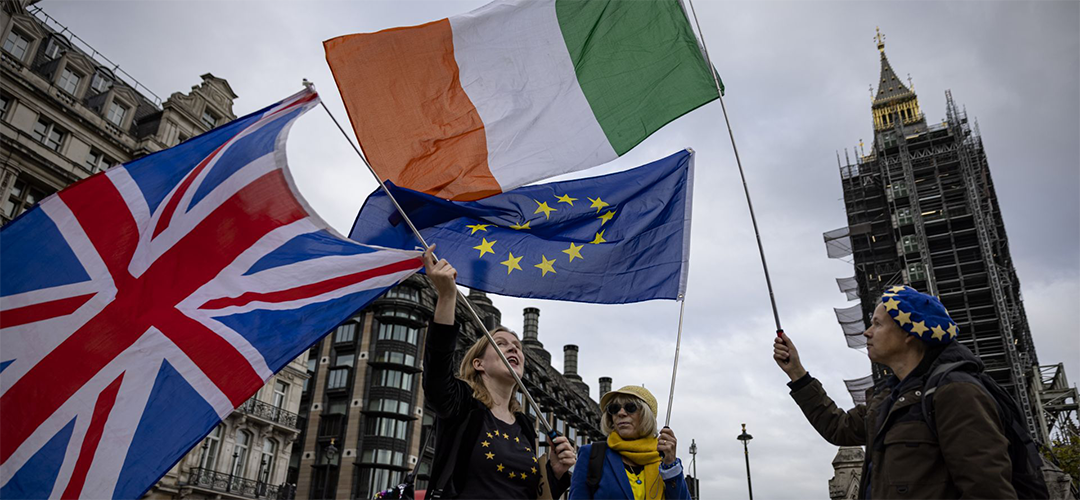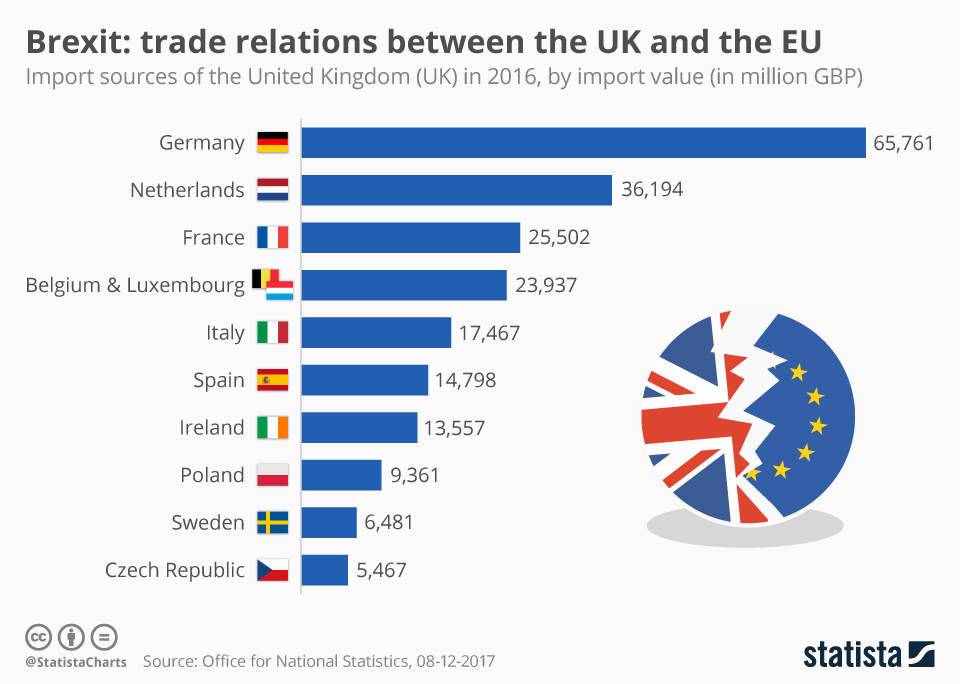THE éIRE IS RISING!
July 2, 2022 | Expert Insights

BREXIT had spelt doom for the Northern Ireland (NI) Protocol, which was achieved after so much bloodshed. Now amendments are being promulgated that would reflect upon UK's credibility as an honest broker to its citizens of the fractious province of Northern Ireland. Even more serious is that these amendments may incite a long-drawn contentious legal battle that will further vitiate the already tense atmosphere. The political and economic impacts are still unforeseen but may be severe.
Background
Prior to its conquest by the English, present-day Northern Ireland was predominated by Catholic Irish-speaking Gaels. As is the norm with all conquests, the most fertile land was confiscated as Crown property, and protestant settlers were brought in from England to run these farms. Labelled as the 'loyalists/ unionists', these settlers became the most dominant segment in NI, incurring the protests of the local catholic Irish majority. In 1641, the Irish Catholics (now labelled as nationalists) rebelled, demanding self-governance, and this long-drawn sectarian conflict was to continue well into the 21st century, becoming world-famous as the 'troubles.'
It was hoped that the 1998 Good Friday Agreement (GFA) or the Belfast Agreement would finally put to rest the ghosts of 1641 and thereafter. It included a ceasefire, decommissioning of weapons, police reforms and most notably, a definitive status for Northern Ireland as a part of the UK, until a majority vote of NI citizens voted for Irish reunification. More importantly, Northern Ireland's present devolved system of government is based on the agreement. With the entry of the UK and the Republic of Ireland into the EU, a soft border along Northern Ireland was created to permit free trade and unencumbered flow of goods within the Isle.
For the next two decades, general peace and prosperity prevailed till BREXIT became a serious issue in the UK. UK's exit from the EU in 2019 brought into focus the possibility of a hard border along with NI and the Republic of Ireland, which remained an EU member.
To protect the Good Friday Agreement and prevent a relapse into a hard Irish border, the British government signed the Northern Ireland Protocol. This Protocol drew flak from the DUP (Democratic Unionist Party) and threatened to stall the Assembly's functioning until its manifesto of changes was made. In light of the DUP’s concerns and “unexpected problems” of the Protocol, the Johnson government introduced specific amendments to it, stoking a lego-political and economic firestorm.
The NI Protocol, as a part of the Brexit Withdrawal agreement, provides for a special trade arrangement between the UK and Ireland. Instead of a hard Irish land border, a de facto border is drawn in the sea, and only certain goods from any part of the UK (mainly agro products) are checked at Northern Ireland ports and then transported into the Republic. Unionists believe this border undermines their position in the UK and have made political hay of it. Until the Protocol is scrapped or amended to meet the DUPs demands, they refuse to participate in the devolved power-sharing executive in NI, effectively stalling Stormont.
The amendments propose the creation of two sea lanes as opposed to a single expansive sea border- red and green for the transportation of goods from Britain. The green lane was for goods destined for NI, requiring minimal paperwork and zero checks, while the red lane was for goods destined for Ireland, which would go through customs checks at NI ports and be subject to EU mandates. Additionally, there would be a tax reform wherein the British government could permit breaks and pay out subsidies and, lastly, approach an independent body for dispute resolution regarding trade in NI instead of the EU Court of Justice.

Analysis
The Protocol amendment has evoked a storm of criticism both within and outside the UK. Some British officials, while confessing the illegality of the amendments, justified its existence by saying that “it only broke the law in small and specific ways”.
The British government has sought relief under the provisions of Article 16 of the Protocol, which sanctions any unilateral "safeguard" measures taken by the EU or UK if the deal is leading to serious practical problems or causing a diversion of trade. It cites the non-functioning of the government in NI, that the Protocol undermines the Good Friday Agreement and threatens peace and political stability in NI, warranting amendments to the terms of the agreement.
The EU threatened legal action against the UK for the unilateral imposition of changes to the Protocol, which was in contravention of international law, by which the agreement was also governed. The European Commission said it would restart legal action it had paused last March. The Commission has also initiated two new proceedings against Great Britain related to failing in its obligations to share trade data and set up border inspection posts. This has increased the probability of a full-blown trade war between the UK and the EU. The timing could not have been more preposterous with the ongoing Ukrainian conflict, weaning off Russian oil and a looming cost of living crisis in the UK.
Furthermore, the grounds for introducing the amendments are shaky- the claim of foreseeability of the Unionists’ discontentment with the Protocol was well publicised at the time it was being negotiated. Additionally, given the nature of NI politics, the Unionists’ opposition to and the Nationalists’ support of the Protocol are hardly unexpected.
Until the Unionists threatened to stall Stormont last month, the incumbent British PM believed that the deal was “a good arrangement with least possible bureaucratic consequences“ and that the agreement was fully compatible with the Good Friday agreement. In a sudden change of tune in July 2021, the PM believed the Protocol undermined the Belfast agreement and put forth his proposals which turned into a bill the following year and was finally introduced as law on Monday. This also contradicts his claims that the amendments “as not a big deal”; they amend many of the pre-negotiated terms that the PM himself agreed to.
Unless the parties (EU and UK) return to the negotiating table and find a solution that is mutually agreed upon, it could have far-reaching ramifications for NI, such as political instability due to Sinn Féin's (Irish nationalist party, which won the general elections in the Irish Assembly in May) vehement opposition to the amendments and even the possibility of violence.
Assessment
- The Johnson government is skating on very thin ice despite their narrow win over the no-confidence vote. Along with the 'Partygate’ scandal, the NI protocol issue may well turn out to be the final straw that broke the government’s back.
- The reunification of Ireland seems an even more distant dream than it was a few decades ago. With unionists strongly favouring the amended Protocol, which the nationalists oppose, a general spirit of Irish unity seems to be at an all-time low. The question remains whether, after its electoral victory, will Sein Finn reinvigorate its nascent desire to seek unification with the Irish Republic. The sparks ignited by the amendments to the NI Protocol could well lead to a bigger fire. Scotland's First Minister Nicola Sturgeon has already fired the first shot setting 19 October next year for the second referendum on Scottish independence.
- With Brexit and a possible French exit (contingent on NUPES forming the parliamentary majority this Sunday), the strength and stability of the European alliance are being tested. Now with the EU moving forward on its legal proceedings against the UK and a probable trade war, this is another strong blow to European cooperation and sovereignty.








Comments